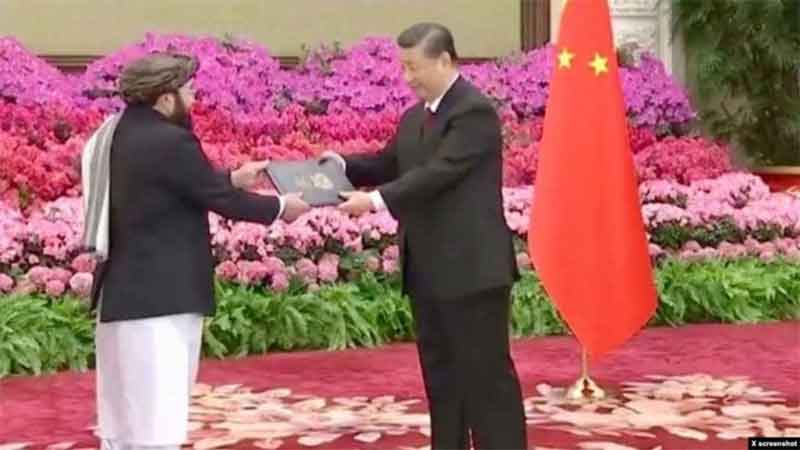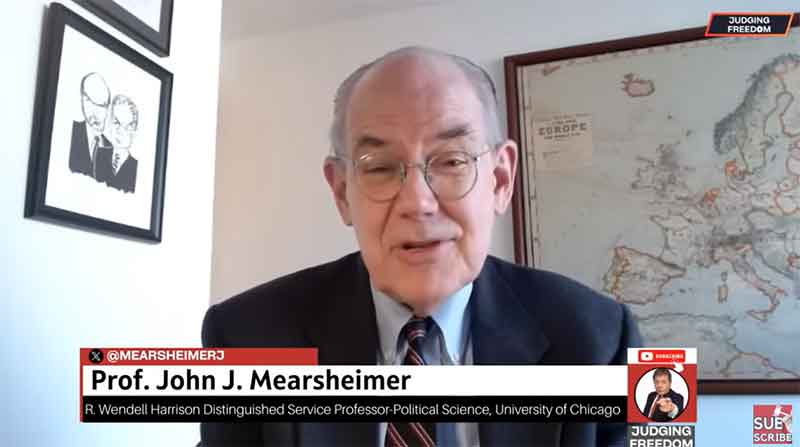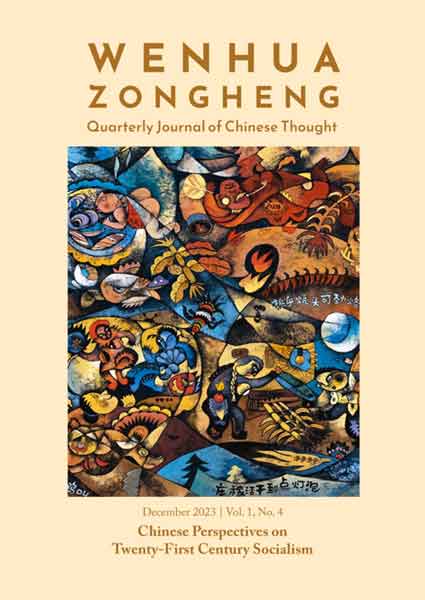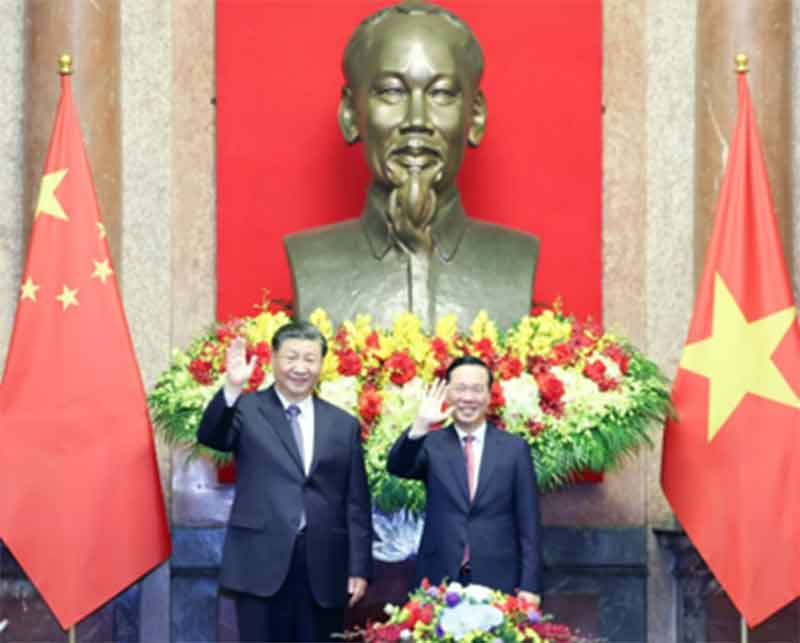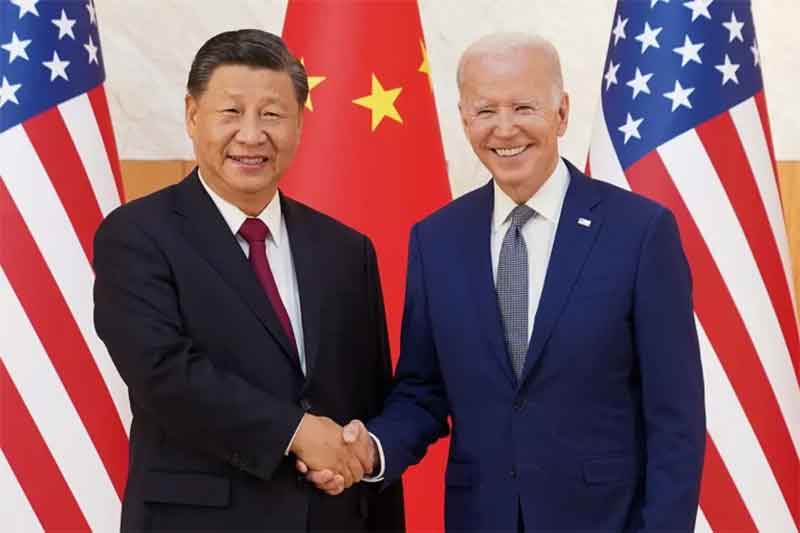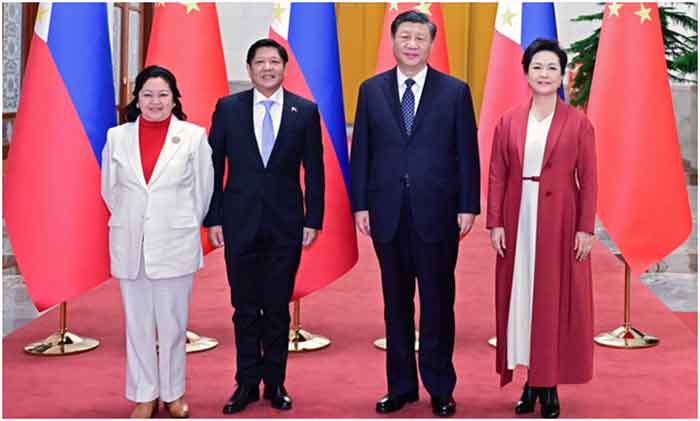
Chinese President Xi Jinping and his wife Peng Liyuan and Philippine President Ferdinand Romualdez Marcos Jr and his wife Maria Louise at the Great Hall of the People in Beijing on January 4, 2023. Photo: Xinhua
In an important development in the south-east Asia region, China and the Philippines have agreed on issues vital for the region and in the geo-strategy related to the Indo-Pacific. A Reuters said:
China and the Philippines said in a joint statement on Thursday they have agreed to set up a direct communications channel between their foreign ministries on the South China Sea to handle disputes peacefully.
The joint statement, which contained 14 agreements aimed at cooling security tensions and boosting economic cooperation, comes as both sides strive to mend a relationship hurt after the Philippines sought a 2016 arbitral ruling that invalidated China’s expansive claims in the South China Sea.
The Philippines has previously raised concerns over reported Chinese construction activities and the “swarming” of Beijing’s vessels in disputed waters of the South China Sea, an area rich in oil, gas and fishery resources.
In the joint statement issued after Philippine President Ferdinand Marcos Jr met Chinese President Xi Jinping in Beijing on Wednesday, both leaders reaffirmed that their countries would respect each other’s sovereignty and territorial integrity.
Both sides also agreed to resume talks on oil and gas exploration in the South China Sea and discuss cooperation on areas including solar, wind, electric vehicles and nuclear power.
Coastguards from China and the Philippines would also meet “as soon as possible” to discuss “pragmatic cooperation”.
Both countries would consider informing each other when firing rockets and cooperate on the retrieval of rocket debris, the statement said.
Last November, when debris from a Chinese rocket fell in the South China Sea, a Chinese coastguard ship had stopped a Philippine boat from trying to tow it away.
Both countries reaffirmed the importance of maintaining peace and stability as well as freedom of navigation and overflight in the South China Sea, and will hold an annual dialogue on security, the statement said.
On the economic cooperation front, China agreed to let in more Philippine imports, with the aim for bilateral trade to revert to or surpass pre-pandemic volume.
Both sides also promised to boost tourist numbers and flights between both capitals to pre-pandemic level.
The joint statement also said that both sides will cooperate on vaccine procurement. China is among the world’s top exporters of COVID-19 vaccines.
Marcos’s three day visit to Beijing comes as China re-emerges from a self-imposed border shut-down since the pandemic started in 2020 which has disrupted trade and hurt its economy.
Both sides also renewed an agreement on the Belt-and-Road Initiative, Xi’s signature strategy on overseas infrastructure investment.
Media reports from China said on Jan 04, 2023:
China-Philippines ties enter ‘new golden age,’ cooperation to be greatly enhanced
Chinese President Xi Jinping met visiting Philippine President Ferdinand Marcos Jr. in Beijing on Wednesday, with both sides expressing great hope, confidence and determination to further develop bilateral relations to a higher level. Chinese experts said the successful visit proves there is little room for outside forces like the US to meddle in the South China Sea situation and interrupt the two countries’ efforts to promote common development.
According to a readout released by the Chinese Foreign Ministry, Xi said to Marcos that “48 years ago, your father [Ferdinand Marcos Sr., former Philippine president 1965-1986] and the old generation of Chinese leaders” made the historic decision to establish formal diplomatic ties between China and the Philippines.
“Hopefully, your visit will not only be a ‘trip of reminiscence’ but also a ‘trip of opening future.’ China will always place the Philippines at a prioritized direction for neighboring diplomacy, and to insist looking the China-Philippines relations from a height of strategy and over-all situation,” Xi noted.
Xi said that China and the Philippines are both developing countries in Asia, and the development of the two countries is rooted in a regional environment of good neighborly and friendly relations, and rooted in a big Asian family of win-win cooperation. “The Chinese side is willing to focus on cooperation and development with the Philippines and other ASEAN members, and safeguard the centrality of ASEAN in the regional cooperation.” It will make the region get rid of the shadow of the Cold War, and free from bloc-to-bloc confrontation, and remain to be a high ground for development and prosperity, Xi noted.
Marcos said it gives him a great pleasure to pay the long-awaited visit to China and that this is his first state visit to a non-ASEAN country. Marcos said he hopes to prove to the world through this visit that Philippines-China relations are in good shape and important, and both sides are committed to upgrading the ties.
The Philippine president said during the meeting that the Philippines is willing to keep appropriately handling the maritime issues via friendly coordination with China, and will restart consultation with China on exploration and mining of oil and gas.
Marcos thanked China for the great assistance in helping the Philippines fight the COVID-19 pandemic, and he hopes after the pandemic, more Chinese people will come to the Philippines for tourism and study. “I have full confidence for the prospect of the China-Philippine relations’ development,” he said.
After the meeting, the two leaders witnessed the signing of a series of cooperation documents related to the China-proposed Belt and Road Initiative, covering fields including agriculture and fisheries, infrastructure, finance, customs, e-commerce and tourism.
New golden age
Chinese analysts said the China-Philippines relations will see great development in 2023 since the two countries will put in joint efforts to promote the ties with full speed. These not only cover traditional fields of cooperation like infrastructure, agriculture and trade, but include ones that require high-level mutual trust like joint exploration of energy resources in the South China Sea, and coordination on significant matters about politics and security like the Russia-Ukraine conflict and the Taiwan Straits situation that both sides are concerned about.
Xu Liping, director of the Center for Southeast Asian Studies at the Chinese Academy of Social Sciences, told the Global Times on Wednesday that “the state visit by Marcos is a trip to initiate a ‘new golden age’ for the China-Philippines relations.”
China and the Philippines had a “golden age” during the leadership of former Philippine president Gloria Macapagal Arroyo, Xu said. During that time, the two countries respected each other and saw win-win cooperation, and although disputes on the South China Sea issue existed, the two countries did not intensify conflicts or frictions, but appropriately managed their differences and promoted cooperation at the same time, Xu noted.
This golden age started by former president Arroyo was ended by the administration of Benigno Aquino III since the Aquino government decided to provoke China on the South China Sea issue and create a series of conflicts and tensions in the region to serve the US strategy that aims to contain China and interrupt regional peace and stability.
The Marcos government is trying to improve bilateral ties based on the foundation that was established during the tenure of former Philippine president Rodrigo Duterte, who greatly fixed ties with China and rejected US attempts to use the Philippines as a pawn to contain China, Xu said.
China and the Philippines share very broad common interests and have the potential to explore more benefits in fields like infrastructure construction, agriculture and energy cooperation, as well as people-to-people and cultural exchanges, he said.
For security affairs, the two countries will build more mechanisms to improve communication, such as a communication channel between the foreign ministries of the two sides on the South China Sea issue, and will also improve coordination mechanisms set up during tenure of Duterte to prevent sovereignty disputes that could damage bilateral ties, analysts said.
On international hotspot issues of shared concern like the Russia-Ukraine conflict and sensitive matters related to interference from outside forces that affect regional peace and stability like the Taiwan Straits situation, the two sides will also boost coordination and build more consensus, so that bilateral ties will be able to withstand the impact of potential geopolitical crises in the future, Xu noted.
Impacts from the US
The Philippines is an ally of the US, so it would be natural to see Washington attempt to pressure and exert influence on Manila to interrupt China-Philippines ties, said analysts.
Zhou Fangyin, a research fellow at the Guangdong Institute for International Strategies, told the Global Times that as long as China and the Philippines can withstand the impacts and interruption from the US and stabilize the South China Sea issue together, that will be a very big success for regional security.
Marcos has a six-year term, and US policymakers consider that the next decade will be crucial for their “competition” with China, so if China can ensure a peaceful South China Sea situation together with the Marcos’ government and other regional countries, that would be historically significant, Zhou noted.
According to the content of the talks between Xi and Marcos, the two countries share common ground to appropriately handle issues on the sea, and agreed to talk about joint exploration and mining of oil and gas resources in the South China Sea, so experts consider the likelihood of the US leveraging sovereignty disputes to interrupt the two countries’ cooperation is slim.
The Philippines has learned from the past, and current leaders understand what their country can get from pragmatic and friendly cooperation with China, and what they would lose if they unwisely allow themselves to be used by Washington to contain China. Today, since the US has very limited strength and influence to offer concrete benefits to seduce regional countries to serve its hegemonic strategy, the chance of Washington interrupting the South China Sea issue is getting less and less, analysts said.

